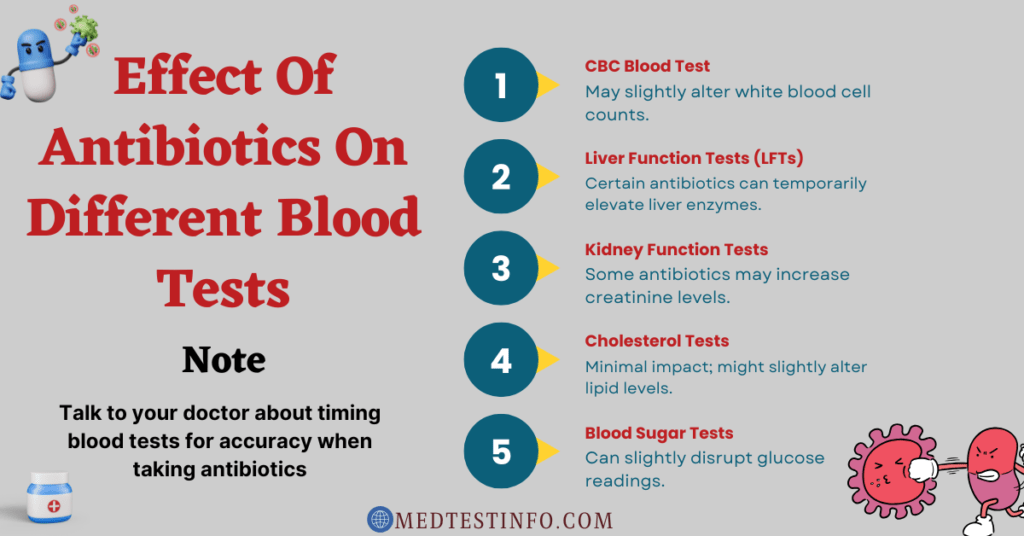
Overview
Blood tests are essential to modern medicine, providing crucial insights into a person’s health status. They assist clinicians in diagnosing problems, monitoring diseases, and assessing the efficacy of therapies. However, a common question is whether some medications, such as antibiotics, can interfere with blood test findings. If you’re taking antibiotics and have a blood test coming up, do antibiotics affect blood tests?
The short answer is that antibiotics can affect specific components of blood tests. Although antibiotics are intended to treat infections, they can also interact with the body and involve a variety of biological indicators that blood tests detect. This is especially important to note if you’re having testing for liver function, renal function, or a complete blood count (CBC), as some antibiotics might alter blood results.
In this post, we will look at how antibiotics can modify specific indicators and affect the accuracy of blood testing. Understanding how antibiotics interact with the body and potentially interfere with test results allows you to make more informed decisions about when to take your tests and consult your healthcare practitioner for the best advice.
We will investigate questions such as:
How exactly can antibiotics affect blood test results?
Are there certain types of tests that antibiotics are more likely to affect?
What should you discuss with your doctor if you take antibiotics and require a blood test?
This article benefits individuals, medical students, and healthcare professionals who want to understand better how antibiotics may affect blood test accuracy. It focuses on standard blood tests and provides suggestions for patients and professionals. This article is your primary source of information for administering blood tests while taking antibiotics.

How Antibiotics Affect Different Types Of Blood Tests
Understanding the effect of antibiotics on blood test results can help avoid misinterpretations and ensure the accuracy of your health information. Let’s look at how antibiotics affect key blood test markers and what you should know if you take medicine.
Affect On A CBC Blood Test
The Complete Blood Count (CBC) is one of the most popular blood tests, which counts white blood cells (WBCs), red blood cells (RBCs), and platelets. Certain antibiotics, particularly those used to treat bacterial infections, can alter the body’s immunological response and white blood cell count.
White Blood Cells (WBCs): Antibiotics may increase white blood cells (WBCs) due to the body’s reaction to the treated infection. This can make it appear like an infection is still present when it is clearing.
Red Blood Cells (RBCs): Some antibiotics, particularly long-term ones, can decrease RBC count, which may be misconstrued as anaemia.
In short, if you’re scheduled for a CBC, you should talk to your doctor about waiting a few days after stopping antibiotics to ensure reliable findings.
Affect On A Liver Function Tests
Liver function tests (LFTs) use enzymes and proteins to evaluate liver health. Because many antibiotics are metabolized in the liver, they might temporarily elevate enzyme levels, giving a false impression of liver strain or inflammation.
ALT and AST Enzymes: These liver enzymes may rise while the liver attempts to digest some antibiotics. This elevation is often transitory, but it may impact results.
Suppose you’re taking antibiotics that the liver metabolizes. In that case, waiting a few days before testing can help stabilize liver enzyme levels, resulting in a more accurate measurement.
Antibiotic Effects On Kidney Function Tests
Kidney function tests analyze chemicals such as creatinine and blood urea nitrogen (BUN), which show how well the kidneys filter waste. Certain antibiotics, particularly those harsh on the kidneys (such as aminoglycosides), may influence these indicators.
Creatinine Levels: Antibiotics that alter renal function can raise creatinine levels, indicating diminished kidney function even when no underlying problem exists.
If you’re taking antibiotics, talk to your doctor about when you should have a kidney function test to ensure that any variations in these values reflect your genuine kidney health.
Can Antibiotics Affect Cholesterol Testing Results?
While less common, certain antibiotics can alter cholesterol test results. These drugs can occasionally disrupt lipid metabolism, resulting in modest changes in cholesterol levels. However, this is usually a minimal effect.
Suppose you are receiving antibiotics and require a cholesterol test. In that case, consult your doctor about whether waiting until after your round of antibiotics is appropriate.
Impact Of Antibiotics On Blood Sugar Tests
Antibiotics, especially over time, may interfere with blood sugar testing. This is especially useful for individuals tracking diseases such as diabetes.
Glucose Levels: Certain antibiotics might temporarily disrupt glucose metabolism, causing modest changes in blood sugar readings.
Suppose you’re taking a fasting blood sugar test. To ensure a more accurate result, it may be advisable to schedule it a few days after finishing antibiotics.
Importance Of Blood Tests For Diagnosing Health Conditions
Blood tests give doctors an overview of various health indicators, such as red and white blood cell counts, liver enzymes, cholesterol levels, and more. These markers can disclose a lot about a person’s health and assist in diagnosing disorders, tracking treatment progress, and even detecting early signs of disease. However, precision is critical; little variations in blood levels can lead to misinterpretations, affecting diagnosis and treatment.
Blood Tests After Taking Antibiotics
Time can be essential for antibiotic-treated individuals to achieve reliable blood test findings. Some antibiotics can temporarily affect liver enzymes or kidney markers, affecting test results. For example, perform a blood test right after taking antibiotics. The results may show higher liver enzyme levels or abnormal white blood cell counts, representing the body’s response to the prescription rather than your genuine health status.
To avoid this, healthcare experts may recommend waiting a few days after stopping antibiotics before undergoing specialized blood tests. This permits the body to digest and discard the medicine, lowering the likelihood of transitory medication-related alterations influencing test results.
Why Accurate Results Are Critical For Health Decisions
Accurate blood tests are necessary for clinicians to measure patient health accurately. Inaccurate test findings can have significant consequences, mainly if antibiotics affect the numbers and cause inaccurate interpretations. For example:
White Blood Cell Count: Increased numbers may indicate infection or inflammation. Suppose antibiotics interfere with blood testing and temporarily elevate WBCs. In that case, doctors may feel there is a persistent infection when there isn’t.
Liver Enzymes: Because some antibiotics are processed in the liver, they might temporarily raise enzyme levels, creating the appearance of liver strain or damage.
In the following sections, we will examine more closely how antibiotics alter blood test markers and how certain antibiotics may affect different types of blood tests. Understanding how antibiotics may change these numbers allows you and your healthcare practitioner to make more informed decisions about test timing and result interpretation.
Factors That Affect Blood Test Accuracy
Several factors can affect blood test accuracy, including fasting, hydration, physical activity, and medication. Will antibiotics influence blood test results? Yes, primarily since antibiotics are meant to interact with the body at the cellular level to fight off microorganisms. As they break down in the body, they can sometimes affect the quantities of substances measured by blood tests, resulting in findings that do not accurately reflect a person’s natural health state.
When Should Blood Tests Be Scheduled After Taking Antibiotics?
Doctors frequently recommend blood testing after a short period following antibiotic treatment. This permits medication-altered indicators to return to baseline levels, providing a more complete picture of your health. Blood tests after taking antibiotics may be more accurate if the body has had time to digest and eliminate the medicine.
Frequently Asked Questions (FAQs)
Understanding how antibiotics affect blood test results might help you better manage your health. Here, we answer some frequently asked questions to shed additional light on specific cases.
Antibiotics can impact CBC blood test findings. Antibiotics can cause changes in white blood cell counts as the body reacts to the illness or the treatment itself. If you’ve recently taken antibiotics, your CBC results may show high or changed readings, giving the impression of a persistent disease or inflammation.
Let your doctor know if you need to take antibiotics before a fasting blood test. Some antibiotics may interfere with test findings, particularly liver or kidney function tests. Your doctor can advise you on the best time to take your test to get the most accurate results.
Certain antibiotics may influence cholesterol test results by temporarily altering lipid metabolism. This effect is usually small, but if cholesterol measurement is critical, you may want to postpone testing until you finish the antibiotic treatment.
Yes, certain antibiotics can affect blood sugar test results. Antibiotics can occasionally cause slight variations in blood glucose levels, which is especially important for diabetes patients because it might confuse with blood sugar measurement.
Getting a blood test while taking antibiotics is possible, but the results may be affected. For example, antibiotics that affect kidney or liver function may alter indicators associated with these organs. It is best to consult with your doctor about whether to wait until after the antibiotic course is completed to obtain the most accurate findings.
An antibiotic sensitivity study identifies the most successful antibiotics for treating a specific bacterial infection. The terms “sensitive,” “resistant,” and “intermediate” describe how bacteria respond to each drug. For example:
Sensitive: The antibiotic is probably adequate.
Resistant: The bacteria does not respond to the medication.
Intermediate: The effectiveness varies according to dosage and infection severity.
Generally, it is best to avoid donating blood while taking antibiotics until you fully recover from the infection and finish the treatment. This ensures that the donated blood is safe for recipients and unaffected by antibiotics.
Antibiotics can affect some blood tests, although the effects differ depending on the type of antibiotic and the individual blood indicators. Kidney function tests, liver enzymes, and CBC findings may be more sensitive to alterations, potentially compromising expected blood test results when taking antibiotics.


